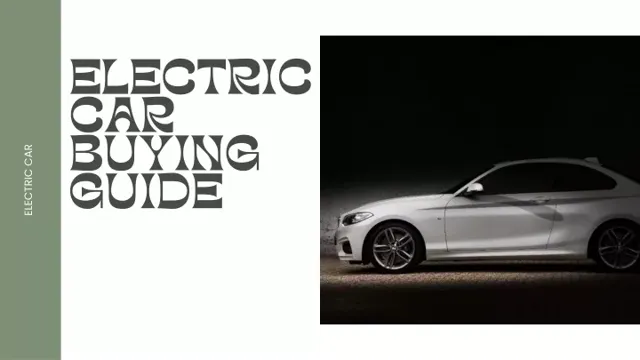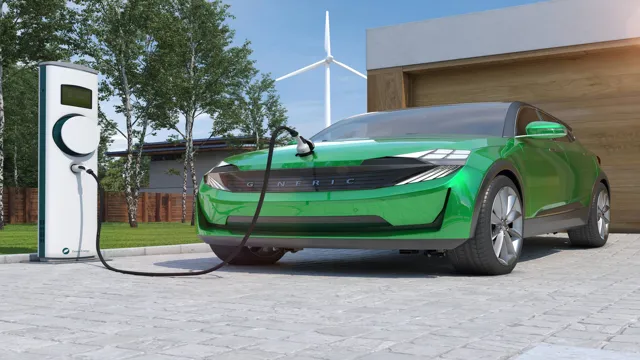Your Ultimate Guide to Buying a Used Electric Car: Tips and Tricks to Navigate the Market and Find the Perfect Ride
Electric cars have become increasingly popular over the years, as people become more aware of the environmental benefits of using sustainable transportation. However, new electric cars can be expensive, often out of reach for the average consumer. This has increased the demand for used electric cars, which can be a more cost-effective option for those looking to go green on a budget.
But buying a used electric car requires a bit more research than buying a traditional gas-powered vehicle. There are some unique factors to consider, like battery health, charging infrastructure, and maintenance costs. In this guide, we’ll walk you through everything you need to know about purchasing a used electric car.
First, we’ll cover the basics of electric vehicles, including how they work and the different types of electric cars on the market. Then, we’ll dive into the specifics of buying a used electric car, from understanding the pricing and financing options to inspecting the vehicle and taking it for a test drive. We’ll also discuss some common concerns that people have when considering a used electric car, such as the lifespan of the battery, the availability of charging stations, and the overall cost of ownership.
By the end of this guide, you’ll have all the information you need to make an informed purchase and find the right used electric car for your needs. So let’s get started!
Find the Right Model
When it comes to buying a used electric car, it’s essential to find the right model that fits your needs. First off, consider the range of the vehicle and how it aligns with your daily driving habits. For instance, if you have a long commute or often take road trips, a vehicle with a longer range may be necessary.
Next, think about the battery’s lifespan and whether it may need replacing soon; this could impact your maintenance costs down the road. Additionally, look at the available charging infrastructure in your area, as this can affect your ability to travel long distances comfortably. Finally, research the car’s safety ratings and features, as well as its reliability scores.
Overall, finding the right used electric car requires a bit of research and consideration, but it’s worth the effort to ensure you’re purchasing a vehicle that aligns with your needs and offers reliable performance.
Research Types & Prices
When it comes to research, finding the right model is crucial to achieving your desired results. There are different types of research models available, each with its unique characteristics and prices. Understanding the differences between these models is essential to choose the one that best suits your needs.
Some research models are more suitable for quantitative data, while others are more geared towards qualitative data. It is essential to consider the scope of your research before committing to a particular model. Prices vary widely depending on the type of research model you choose, with some models being more expensive than others.
However, cost should not be the only factor you consider when selecting a research model. The reliability and validity of the data collected, as well as the ease of use, should also be taken into account. By carefully considering all the options and selecting the most appropriate research model, you can ensure that your research results are accurate and reliable.

Know Battery Range & Maintenance
When shopping for an electric vehicle, it is crucial to find a model that fits your needs and lifestyle. One important factor to consider is the battery range. Different models offer different ranges, and it is essential to know the range you require before making your purchase.
If you plan on using your electric vehicle for long commutes or road trips, you’ll want a model with a larger battery range, while those who only use their electric vehicle for short daily commutes may not need as much range. It’s also important to consider battery maintenance. Like any other battery, the battery in your electric vehicle will degrade over time and lose some of its capacity.
However, proper maintenance can help extend its lifespan. This includes regularly charging the battery, keeping it in a cool location, and avoiding frequent fast charging. By finding the right model with the appropriate battery range and maintaining your battery properly, you can ensure that your electric vehicle will serve you well for many years to come.
Inspect the Vehicle
Inspecting the vehicle is a crucial part of buying a used electric car. Before making any decisions, it’s imperative to inspect the car thoroughly to ensure that it’s in good condition and will not have any major issues in the near future. Check for any signs of damage, such as scratches or dents, as well as any signs of wear and tear on the tires.
Don’t forget to check the battery’s condition, as this is a significant component of an electric car. Make sure to take it for a test drive and see how it performs on the road and evaluate its charging time and range. If you’re unsure about anything, don’t hesitate to ask the seller or a mechanic for their opinion.
Being thorough in your inspection will give you peace of mind and enable you to make a sound decision when purchasing a used electric car.
Check Battery Health & Life Expectancy
When it comes to inspecting a vehicle, one crucial factor to consider is the battery health and life expectancy. As we all know, a car’s battery plays an essential role in powering the vehicle’s electrical components and providing a smooth start. Neglecting your battery could lead to dire consequences, leaving you stranded in the middle of nowhere or forcing you to call for a tow truck.
Therefore, it is essential to keep a keen eye on your car battery’s health and lifespan. When inspecting your battery, you must ensure that it is free of corrosion and securely fastened, and the terminal connections are tight. You can also use a multimeter to check the battery voltage.
If it falls below the recommended levels, it’s time for a battery replacement. So, make sure to inspect your battery periodically and keep it in top shape to avoid any untoward incidents on the road.
Examine Exterior for Damage & Wear
When it comes to buying a car, making sure it’s in top condition is essential. An important part of inspecting a vehicle is checking the exterior for any damage or wear. This can include scratches, dents, rust and overall paint condition.
Taking a close look at the exterior will give you a good idea of how the car has been treated and if it has been involved in any accidents. If the car has been kept in good condition, you can be confident that it will continue to perform well. On the other hand, if there is significant damage on the exterior, it might be a sign that there are other issues with the car as well.
Make sure to give the exterior a proper inspection before committing to buying a car. By doing so, you can save money and avoid potential headaches down the road. Remember, a car’s exterior is often a reflection of what’s going on under the hood.
Assess Interior Condition & Features
When you’re in the market for a used car, it’s crucial to assess the vehicle’s interior condition and features. Your inspection should start from the moment you enter the car, looking for any foul smells, stains on the carpet or seats, and signs of wear and tear. Sit in the driver’s seat and adjust it to your comfort level.
Check the seat belts for any signs of damage and ensure they work correctly. Turn on the car’s electronics, including the lights, radio, and air conditioning, and test the windows and locks to make sure they function correctly. Don’t forget to check the condition of the dashboard, steering wheel, and pedals.
Are there any cracks, dents or signs of damage? Finally, inspect the trunk’s condition, making sure it’s clean and free of any damage or water stains. By thoroughly examining the interior and features of the vehicle, you’ll be able to spot any red flags that could be costly down the road.
Schedule a Test Drive
Before you make the final decision to purchase a used electric car, it’s important to schedule a test drive. A test drive allows you to get a feel for the vehicle and see how it handles on the road. You’ll also be able to test the car’s range, acceleration, and braking.
When scheduling a test drive, try to drive the car in a variety of conditions such as highway driving, city driving, and on hills. This will help you get a better idea of how the car performs in different situations. During the test drive, pay attention to any unusual sounds or vibrations, and take note of how comfortable the car feels.
It’s important to take your time and thoroughly evaluate the car before making a purchase. By scheduling a test drive, you’ll have peace of mind knowing that you’ve made an informed decision about your used electric car purchase.
Check Acceleration & Handling
If you’re in the market for a new car, it’s essential to schedule a test drive to check the acceleration and handling. These two factors can make a significant difference in your driving experience. Acceleration is how quickly the vehicle can increase speed, which is crucial for merging onto highways or passing other cars.
On the other hand, handling refers to how well the car can navigate through corners and turns. It’s essential to feel how the car handles, especially if you have a daily commute that involves winding roads or tight spaces. During a test drive, take the car on a variety of roads and speeds to get a feel for both factors.
Some cars may prioritize acceleration over handling, and others may handle better but lack in acceleration. Find the right balance for your driving needs, whether it be for city or highway driving. Don’t rush into a purchase without taking a test drive and finding out how the car accelerates and handles – it could mean the difference between a satisfactory driving experience and a frustrating one.
Listen for Strange Noises
When you’re checking out a pre-owned car, it’s crucial to pay attention to any unusual sounds coming from the vehicle. You don’t want to end up with a car that squeaks, rattles, or clunks incessantly while you’re driving. Listen carefully for any weird noises that don’t seem right, such as grinding sounds when you brake or thumping sounds when you hit bumps.
These could be signs of worn-out brakes or suspension issues that could be very expensive to fix. While some car sounds are perfectly normal, if something doesn’t sound right to you, it’s always better to err on the side of caution. Once you’ve made note of any unusual noises, plan to schedule a test drive with the dealership or owner.
A test drive is a crucial part of purchasing a used car, as it allows you to evaluate the car’s performance and handling, as well as check if everything sounds and feels right. During the test drive, make sure to drive the car on a variety of roads and at varying speeds to see how it handles in different driving conditions. This is also the perfect time to take note of any other issues you may have missed during your initial inspection.
In conclusion, the key to a successful used car purchase is to listen for any strange sounds and to schedule a thorough test drive. By doing these two things, you can go a long way toward ensuring that you get a reliable car that will meet your needs for years to come. Don’t hesitate to ask the dealer or previous owner any questions you may have – after all, it’s your money on the line! Keep in mind that purchasing a used car can be nerve-wracking, but with a little extra diligence, you can make the process a lot smoother.
Get a Professional Inspection
When considering the purchase of a used electric car, one of the most important steps to take is to get a professional inspection. While electric cars have fewer moving parts than traditional gasoline-powered vehicles, they still require maintenance and repairs. A professional inspection can identify any potential issues or problems with the car’s battery, charging system, or other components before you commit to buying.
This not only gives you peace of mind but can also save you money in the long run. Be sure to take the car to a mechanic who specializes in electric vehicles or has experience working on them. By doing this, you can ensure that you receive a thorough evaluation of the car’s condition and make an informed decision about whether it is the right choice for you.
So, before making any final decisions, don’t forget to get a professional inspection for the best used electric car buying experience.
Conclusion
In a world where sustainability and affordability are top priorities, buying a used electric car is the smart choice. Not only will you be reducing your carbon footprint, but you’ll also be saving some serious cash. Just remember to do your research, inspect the vehicle thoroughly, and take it for a test drive before signing on the dotted line.
With these tips in mind, you’ll be cruising in your eco-friendly ride in no time. So, go ahead and make the switch to electric – your wallet and the planet will thank you.”
FAQs
What should I look for when buying a used electric car?
When buying a used electric car, it is important to check the battery’s health, the car’s history, and if possible, have it inspected by a trusted mechanic.
How long do electric car batteries last?
Electric car batteries typically last 8-10 years or 100,000-200,000 miles, but this can vary depending on the model and usage.
Can I negotiate the price of a used electric car?
Yes, just like any other used car, the price of a used electric car is negotiable. Do your research on the market value and use it as a starting point for negotiations.
Can I get a tax credit for buying a used electric car?
No, only new electric cars are eligible for federal tax credits. However, some states may offer incentives for purchasing a used electric car. Do your research to see if your state offers any incentives.



